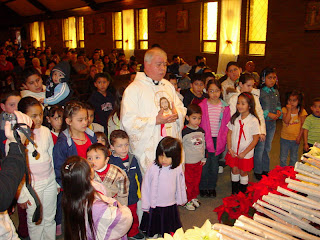
Esta semana celebramos la fiesta del misterio de la Encarnación del Hijo de Dios, que conocemos como Navidad. Como regalo de Navidad, quiero compartir con ustedes una historia y una petición. Allá por el año de 1969 escribí una pequeña obra de teatro, en tres actos, titulada "El Cumpleaños de Dios". El primer acto presenta el relato evangélico del nacimiento de Jesús. El segundo acto narra el origen de la fiesta de la Navidad: una fiesta pagana (romana) que se convierte en fiesta cristiana. El tercer acto trata de plantear la pregunta: ¿dejará la Navidad de ser una fiesta cristiana y volverá a ser una fiesta pagana? Porque fuera de las iglesias, parece ser que ya no se habla ni de la Navidad ni del Hijo de Dios que se hizo un Niño para salvarnos. En algunas partes se llega hasta el extremo de ni siquiera desear una feliz Navidad, sino "felices fiestas", con el pretexto de no ofender a nadie. Por todo esto, quiero pedirles a todos ustedes que no expulsemos a Jesús de nuestras casas ni de nuestro lenguaje. Dios no merece que olvidemos sus muestras de amor a la humanidad. Que nuestros niños y niñas sepan que la Navidad celebra el nacimiento del Hijo de Dios. Es el cumpleaños de Jesús, nuestro Salvador.
Deseo a todos ustedes una muy ¡Feliz Navidad!
El 25 de diciembre cumplo 33 años de mi ordenación sacerdotal. Los invito a que se unan a mi acción de gracias.
Su amigo y servidor
Padre Jesús Camacho
Deseo a todos ustedes una muy ¡Feliz Navidad!
El 25 de diciembre cumplo 33 años de mi ordenación sacerdotal. Los invito a que se unan a mi acción de gracias.
Su amigo y servidor
Padre Jesús Camacho
This week we celebrate the feast of the Incarnation of the Son of God, which we know as Christmas. As a Christmas gift, I would like to share with you a story and, at the same time, a request. Back in the year 1969 I wrote a small theatrical script, in three acts, titled "God's Birthday." The fist act presents the Gospel narrative of the birth of Jesus. The second act recounts the historical and liturgical origin of the feast of Christmas: a pagan feast (Roman) that is converted to a Christian feast. The third act tries to pose the question: will Christmas continue to be a Christian feast or will it return to being a pagan feast? For indeed, outside of church there is no mention of Christmas anymore nor of the Son of God who became a child to save us. Some places even go as far as not wishing a Merry Christmas! but rather "happy holidays," with the pretext of not offending anybody. Because of all of this, I would like to make a request of all of you and that is to not expel Jesus from our homes or our language. God does not deserve for us to forget his great deeds of love for the humankind. May our boys and girls know that Christmas celebrates the birth of the Son of God. It is Jesus' birthday! Our Savior coming to the earth! Nothing less.
I wish you all a very Merry Christmas!
On the 25th of December I celebrate 33 years of ordination. I invite you to join me in my thanksgiving.
Your friend and servant
Fr. Jesús Camacho
I wish you all a very Merry Christmas!
On the 25th of December I celebrate 33 years of ordination. I invite you to join me in my thanksgiving.
Your friend and servant
Fr. Jesús Camacho








